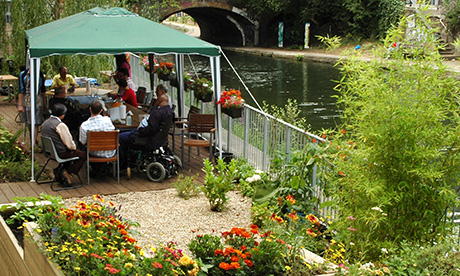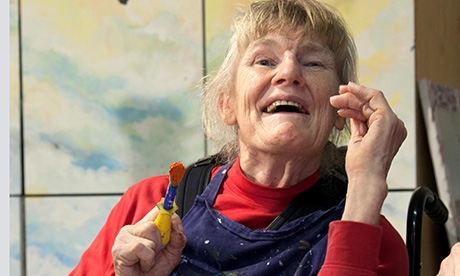Choice in Hackney project makes headway on disability needs

Better communication: A group of Headway regulars in the charity’s garden. Photograph: Headway East London
Bringing care services and their disabled service-users together often comes down to a conversation between administrators and disabled people about their care needs. But it is increasingly being recognised that these conversations need to be handled in new ways.
“You need to tell people what a brain injury is – social workers, solicitors, and doctors,” says Barrie Straddling, who suffered a traumatic brain injury eight years ago. “You look at someone, you look at me, and you cannot tell. Just because someone looks fine, doesn’t mean they are fine.”
Stradling volunteers with Headway, a charity offering support for people with brain injuries. Headway is one of the earliest adopters of a new project called Choice in Hackney which hopes to solve this communication problem.
The Choice project provides advocacy for people trying to access care, and has developed a communications training course, with training given by disabled service-users themselves.
For Stradling, who is learning how to be a communications trainer, the most important thing is to be clear and explicit about disability, which in the case of a brain injury can be invisible. And his own experience has taught him that when it comes to cognitive impairment, good preparation is the key to clear communication.
“If you’re going to speak to somebody, don’t just phone them up and expect them to have all this stuff in front of them if they’ve had a brain injury. Approach them individually if you can, personally,” he says.
Caroline Nelson, director of Choice, believes health and social care providers need training around disability issues. She says: “They need to be aware of our needs in order to provide person-centred planning and support, rather than the traditional way of providing services where we fit into existing boxes.”
The course addresses what Nelson calls “basic things”: ensuring, for instance, that letters sent to people with cognitive impairments are written in jargon-free, simple English with the amount of information kept to an essential minimum. Avoid covering your mouth when talking to people who might need to lip-read, and ensure rooms are brightly lit for the same purpose.
Pen and paper should be on hand for noting down or presenting visually important pieces of information, such as the name of a doctor or a significant date.
The visual medium is crucial, with Nelson emphasising the importance of using a picture of a clock on letters to show the time of a next appointment, as well as a picture of a calendar showing the date, and a photograph of the hospital where it will take place.
Putting disabled service-users in a position of power is another important goal of Choice, says Nelson, pointing out that when users are involved in planning services they tend to use them more.
The long-term plan of Choice is to run a training business, employing disabled service-users and charging fees for their services. “The problem with professionals is they like to spend thousands paying all these big companies to come and train them,” rues Nelson. “But what we’re saying is: let us train you, we have the lived experience, we are experts by experience; it’s about our lives and we know best how to provide services to meet our needs.
The personal stories of people affected by acquired brain injury (ABI) are available online through Headway’s new website whoareyounow.com.
Headway East London is also seeking volunteers. For more information, contact Sheryl Buabin, on 020 7749 7790 or email sheryl.buabin@headwayeastlondon.org.
This article is published as part of a community partnership between the Hackney Citizen and Hackney CVS.

